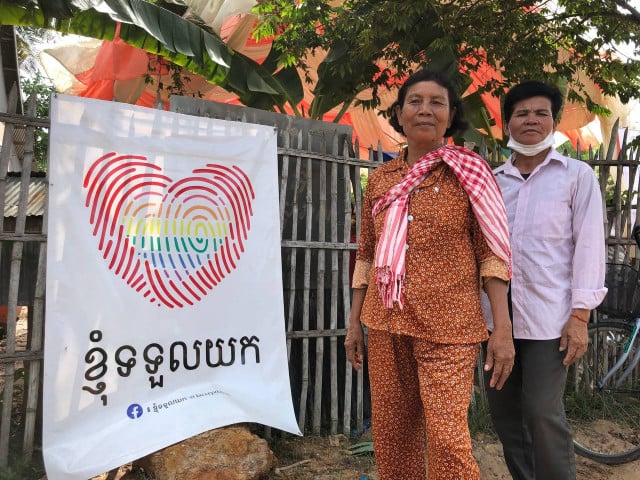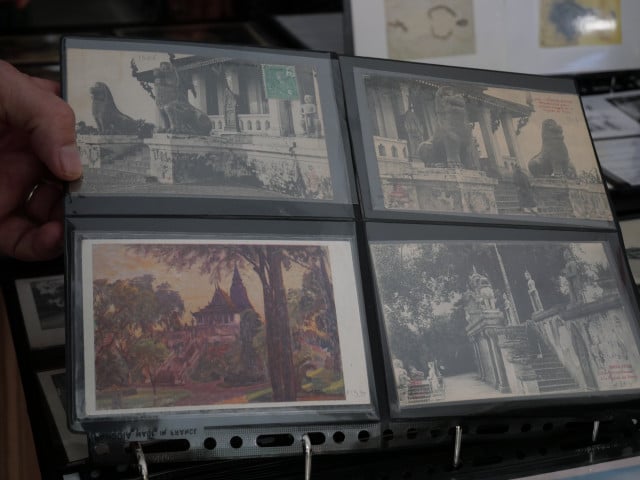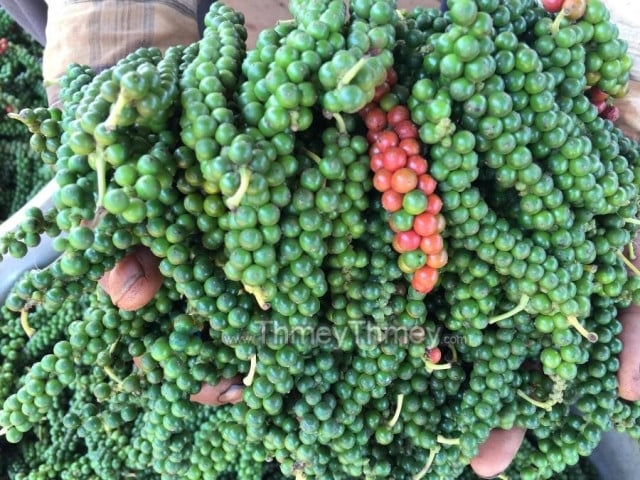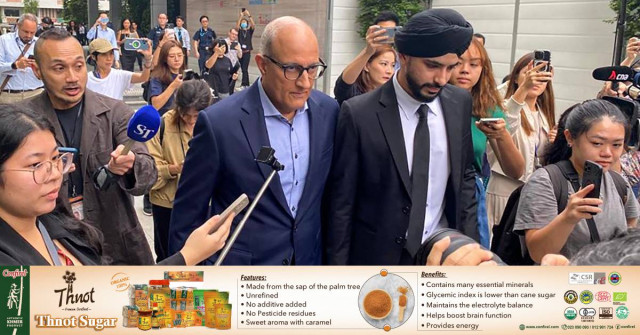LGBT+ Community Winning Battle for Acceptance

- By Teng Yalirozy
- April 15, 2022 5:36 PM
Discrimination fades but equality not here yet
PHNOM PENH – “They restricted my partner from getting together with me because they said loving people of the same sex had no future,” said Sorn Noeun, a transgender man from Prey Veng province, who publicly came out as a part of the LBGT+ community in 2009.
There was a lot of discrimination when his family and neighbors learned of his gender orientation. Some companies did not offer him a job because he had short hair and dressed like a man, Noeun said.
“They asked what I was – not a man or a woman,” he said. “When going to the markets, some people didn’t even want to talk to me.”
However, the negative perceptions of the LGBT+ community as it is broadly known have gradually faded, though not completely, and much advocacy has been accomplished.
“My neighbors don’t call me gay anymore and I can live normally without being stared at like when I first came out,” he said, adding that he has been living harmoniously with his partner and a small business at their house.
Therefore, people can love whoever they want as long as they can manage to have an appropriate livelihood, he said.
Luk Sambath, a resident in Phnom Penh who works in the digital industry at a private company, said he has been supporting the LGBT+ community and had seen it facing quite a number of challenges in the past ten years.
These included discrimination, job opportunities, family, society, education, marriage, and way of life. But he said nowadays, the situation of the community has improved a lot.
“The hardships facing LGBT+ people were the most complicated 10 years ago,” Sambath said. “Due to social pressure, gays were hardly allowed to participate in government and military institutions or related work.”
Although more LGBT+ people are being accepted, Sambath said Cambodian society has not yet fully accepted the community as discrimination still happens here and there. Discrimination is a factor that determines the confidence and social participation of the LGBT+ community, he said.
“I would like to raise the motivation for LGBT+ people to speak out to eliminate gender discrimination.”
Heng Cheyleaphy, program team manager at Rainbow Community Kampuchea (RoCK), said that RoCK, with 13 years of working to advocate and promote LGBT+ rights, has seen the public become open-minded toward the LGBT+ community. In the past no one often talked about or discussed the issues that the community had been facing.
Instead, the public often linked the LGBT+ community to sexual topics or HIV when talking about LGBT+ people, she said. The LGBT+ population was in the past known or called “gay” which was the popular word among the public when they thought people were attracted to the same sex.
There is, however, more than sexual contact with HIV when it comes to discussing the LGBT+ community, she said.
“Among more than 1000 public we interviewed, 50 percent of them supported the community while 50 percent still held a perception that they couldn’t support the community because it was wrong or against nature,” Cheyleaphy said, citing research conducted in 2015.
However, people nowadays seem to be more interested in discussing the issues facing the LGBT+ community, thanks to the popularity of social media platforms, she said. People dare to give their opinions and discuss LGBT+ topics, unlike 10 years ago when the community was little known and considered an unimportant group in society.
“It has helped the public to start paying attention to the community, which in past was perceived as uninteresting, said Cheyleaphy. “It’s because the media is well-known in Cambodia and the community has been supported by the government, while journalists also are interested in writing about the community.”
RoCK has been working closely with local authorities and since 2015, has been promoting LGBT+ rights via Facebook, Cheyleaphy said. In the last three to four years, more civil organizations and communities started to get involved in promoting the equal rights of LGBT+ people, while the government also accepted the nine recommendations including same-sex marriage in the third Universal Periodic Review (UPR) in 2019.
These accepted recommendations on SOGIESC rights (an abbreviation for sexual orientation, gender identity and expression, and sex characteristics collectively for the purposes of law and policy) focused on three main reforms.
These were: amending Article 45 of the Constitution Cambodia to enable legal marriage equality; enacting laws and policies guaranteeing non-discrimination, and enacting legislation allowing gender recognition for transgender people.
The government included the LGBT+ community in the vulnerable group when they devised the fourth and fifth strategic plans to prevent violence against women, said Cheyleaphy. The Ministry of Education also incorporated the Health Education Program, aiming to help children embrace the differences and diversity in society, she said.
“We cannot talk about the rights of women, children, or sexual and reproductive health without talking about the LGBT+ community because some women and children are a part of the community,” said Cheyleaphy. “So, they are prone to violence as well.”
Without the official law, LGBT+ people are still prone to discrimination
Despite the efforts and changes made, the community is still the victims of discrimination, which she said has been a long-rooted concern for the whole LGBT+ community. Although awareness has been raised continuously, some LGBT+ people face discrimination and humiliation at work due to their sexual orientation.
“When such a thing happens, is there any law that prevents discrimination and punishes those who discriminate?” she said. “So, our group is more exposed to discrimination. Discrimination has not improved a lot although the public shows support for us.”
Reflecting on the work of RoCK over the last 13 years, Cheyleaphy said she is proud that the LGBT+ community has become stronger and more resilient, while the LGBT+ population can learn a lot from each other because RoCK is composed of LGBT+ people from different parts of Cambodia.
Lim Borin, a coordinator of the Voice for Gender Equality Project at CCHR, said that young people, particularly in cities, are more accepting and more open-minded of the LGBT+ community because they can find out abouta broad range of issues.
However, the situation is different in the countryside and among elderly people, who have a harder time embracing LGBT+ people and frequently treat them unequally and discriminate against them, he said.
In the last ten years, deeply ingrained cultural norms and harmful gender stereotypes on how both women and men should behave had a significant impact on negative perceptions of and attitudes toward the LGBT+ community, leading to discrimination against LGBT+ people in all aspects of their lives, Borin said.
The LGBT+ movement in Cambodia has progressed and grown in recent years, with more alliances and organizations like Loveisdiversity and the "I Accept" campaign, which was launched by a number of local civil society organizations at the end of 2021 to promote legal marriage equality for LGBTIQ Cambodians, he said.
Furthermore, the Ministry of Education collaborated with civil society and UN agencies to advance the rollout of the new Comprehensive Sexuality Education curriculum in schools, which includes concepts and rights related to sexual orientation, gender identity and expression, and sexual characteristics (from which the SOGIESC acronym is derived) and sexual reproductive health rights (SRHR) for grades 5-11, he said.
“Despite the steps made towards gender equality, harmful gender stereotypes continue to permeate Cambodian society and to enforce negative preconceptions of LGBTIQ individuals,” said Borin.
Little legislative progress has been made despite a growing acceptance of LGBT+ people, he said, adding that domestic law does not recognize transgender Cambodians.
The Government has developed few tangible initiatives to better the lives and rights of persons in the LGBT+ community, hence progress toward advancing LGBT+ rights in 2021 have stalled, Borin said.
While commendable progress has been made in terms of LGBT+ inclusion since the Universal Periodic Review in 2019, the government has taken no significant concrete actions to advance the process of legal reforms required for full implementation of the SOGIESC rights recommendations, he added.
“Cambodia has no legislation which supports LGBTIQ individuals’ right to be legally recognized according to their self-identified gender,” said Borin.
“Similarly, same-sex marriage has yet to be legally recognized in Cambodia. Furthermore, domestic law lacks explicit anti-discrimination protections for LGBT+ people and has no defined sanctions for those who commit hate crimes against LGBT+ people.”
“This leaves the LGBT+ community vulnerable to discrimination and contributes to their marginalization.”
In September last year, 16 civil society organizations issued a statement calling on the government to implement recommendations Cambodia accepted in 2019 during the third Universal Periodic Review of the United Nation Human Rights Council. This calls for the protection of the rights of LGBTIQ people. Their priority is to have same-sex marriage legalized.
Borin said the government should step up its efforts to preserve and promote LGBT+ rights, particularly by taking real steps to implement the nine LGBT+ rights recommendations it approved in the third UPR cycle in 2019.
“The LGBT+ community in Cambodia deserves to be treated equally and not discriminated against. Their rights, such as their right to marry whoever they want, should be fully protected by domestic law and promoted by the Government and other relevant stakeholders,” he said.
Justice Ministry Chin Malin said the Cambodian government has long worked to protect and assist LGBT+ persons, and same-sex marriage is not a criminal offense under Cambodian laws, adding that the community can hold any events or activities without being restricted.
The government has also educated individuals and raised awareness among family, friends, and community members on the importance of avoiding using violence against LGBT+ people in any manner, he said.
“We don’t prohibit them from holding any events or living together. Moreover, Cambodia does not consider their marriage illegal while some countries consider same-sex marriage a criminal offense. The Cambodian government never takes legal action against them,” Malin said.
Chin Malin said the government will continue to support LGBT+ rights and end violence and discrimination against them in their families, educational institutions, workplaces, and across society.
Keo Remy, president of the Cambodian Human Rights Committee (CHRC), said that although there is no official law, Cambodia is favorable to the LGBT+ community since the country does not have the death penalty, while some countries consider homosexuality to be a criminal act punishable by death.
“We are the leading country in ASEAN in promoting same-sex couples and we have been involved with the LGBT+ community countless times among families to raise awareness, especially in families,” Remy said.
On March,23, CHRC said at an event it held with UN Human Rights Cambodia that it would work with LGBT+ organizations on the issues, such as reviewing legalization of same-sex marriage.
CHRC spokesman Katta Orn said Cambodia welcomed the work of NGOs and the CHRC in addressing LGBT+ issues, urging LGBT+ groups to compile laws and research on same-sex marriage for the CHRC to use as a foundation for future advocacy.
Sorn Noeun, a transgender man, hopes that in the future, a law that fully recognizes and protects the LGBT+ community will be created so that any activities of a same-sex couple that require legal documents will be much easier to carry out.
An example is child adoption and registration of birth certificates.
“We want to be able to have a family certificate and birth certificate for our children so that they can go to school and live like normal children whose parents are of different sexes,” said Noeun.
Heng Cheyleaphy of RoCK said the community will still stand strong in the future fighting for equal rights and treatment in society, adding that she wants to see Cambodia become freer where all citizens can live and participate in society as who they are.
“We do not want anything more than other people,” said Cheyleaphy. “We want to have an equal and normal life like other people. They can get married legally. We want that too. We don’t want any special law. We only want equal treatment in society.”















